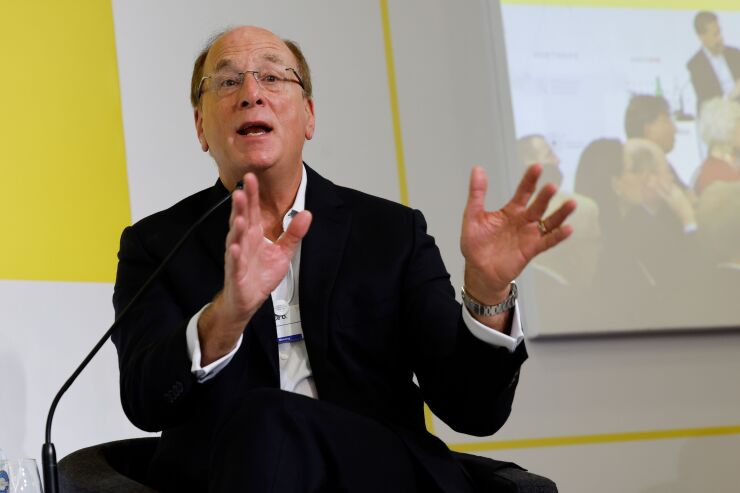
BlackRock Inc. is poised to become a bigger buyer of assets that banks unload to improve their capital and liquidity, after concluding that the industry faces years of upheaval brought on by high interest rates, stringent new regulations and possible consolidation.
Gary Shedlin, a vice chairman of the world's biggest money manager, is leading efforts to position BlackRock funds as sources of capital for banks looking to sell asset-backed securities or large portfolios of consumer, commercial or residential loans.
There's no shortage of supply; lenders are offering assets every day to potential buyers like BlackRock and the pace of big loan sales is ramping up, Shedlin said in an interview. The shifts are part of a long-term secular trend that will see private capital playing a larger role in support of lenders, he said.
"It's a huge opportunity for BlackRock. It's a huge opportunity for our clients," said Shedlin, the firm's former chief financial officer and previously a financial institutions banker at Morgan Stanley. As part of the plan, BlackRock could start new investment vehicles that target bank assets, he said.
BlackRock will join an increasingly crowded field. Private equity and credit managers have been angling to buy dislocated assets from banks, and some of the country's largest alternative-asset managers tried to get into the U.S. government process to auction off lenders after four of them collapsed earlier this year.
Funds managed by BlackRock executives have long invested in asset-backed securities, and the company has advised financial institutions and regulators for years. The new effort reflects executives' assessment that there's more fallout coming from the industry's recent convulsions.
While Shedlin, 59, said the "mini crisis" is now mostly over, banks must still contend with money-market funds that are luring away depositors with higher yields and mismatches between the duration of assets on lenders' books and liabilities to their clients. Some assets including commercial real estate loans are at risk, he said.
BlackRock Chief Executive Officer Larry Fink has said the collapse of midsize U.S. banks this year exposed "cracks in the financial system" and recalled the "slow-rolling crisis" of the savings and loan era of the 1980s and 1990s. BlackRock itself this year was part of an unsuccessful bid by PNC Financial Services Group for First Republic Bank, with the money manager expected to take over residential mortgage assets from the lender.
As a result, U.S. regional banks are shrinking balance sheets as the most aggressive interest rate hikes by the Federal Reserve in decades erodes the value on some of their holdings.
Western Alliance Bancorp last quarter sold roughly $4 billion in assets, while PacWest Bancorp. sold a $3.5 billion portfolio to Ares Management Corp. U.S. Bancorp is making targeted sales and securitizing auto loans, and Citizens Financial Group Inc. said it's looking to streamline its balance sheet.
"If interest rates rose 500 bps and banks didn't change the types of assets they held on portfolio, I'd be more concerned," said Aaron Klein, a senior fellow at the Brookings Institution. "If banks weren't making any changes then they wouldn't be recognizing the change in their funding structure."
Still, top U.S. banking regulators are preparing to release a sweeping plan on July 27 to tighten capital standards, a move that's likely to shake loose more assets. Federal Reserve Vice Chair for Supervision Michael Barr has said the changes will probably result in the largest banks needing to hold an extra two percentage points of capital — or an extra $2 of capital for every $100 in risk-weighted assets.
BlackRock may find itself bumping up against other financial giants like Blackstone Inc., whose Chief Executive Officer Steve Schwarzman said in May it's in talks with several U.S. regional banks to explore purchases of assets and loans they originate.
New Model
While Shedlin doesn't see an immediate "massive fire sale" of bank assets, he said there will be a migration over the next two to three years to a new relationship between investors and banks.
Shedlin foresees banks increasingly pursuing an "originate-to-distribute model," meaning there will be more loans or assets that banks probably will package into securities or sell in portfolios to investors like BlackRock.
"We're not a competitor to them," Shedlin said of banks. "We bring, again, unlike a lot of people, incredibly flexible capital to the table."
BlackRock's existing fixed-income funds, including the Strategic Income Opportunities fund and total return funds, could be potential investors in higher-quality assets offloaded by banks, Shedlin said. BlackRock currently oversees more than $100 billion in securitized assets across a range of funds and accounts.
A more opportunistic investing strategy could focus on scooping up problematic assets from banks that offer higher yields, he said. "Those opportunistic capital pools also both exist today at BlackRock and will exist in the future," Shedlin said.






